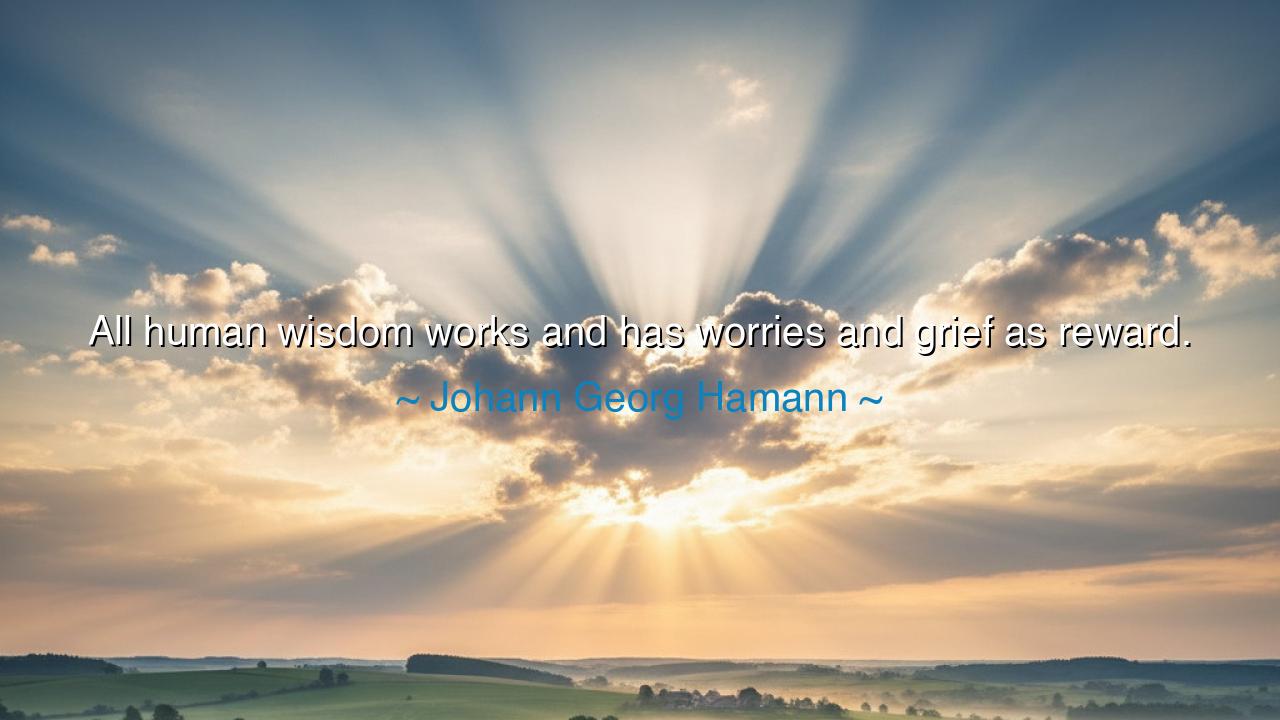
All human wisdom works and has worries and grief as reward.






The philosopher Johann Georg Hamann, often called the “Magus of the North,” spoke with a voice both mysterious and profound when he declared: “All human wisdom works and has worries and grief as reward.” These words pierce to the heart of the human condition, revealing the paradox of earthly understanding. To seek wisdom is noble, yet it brings not only insight, but also a heavy burden. For the more deeply one perceives the truth of life, the more one sees its pains, its injustices, and its fleeting nature. Knowledge illuminates the path, but it also exposes the shadows.
Wisdom is not a crown of glory freely given; it is earned through struggle and labor. To work toward understanding is to wrestle with the mysteries of existence, to question deeply, and to confront the limits of the human spirit. And when this work bears fruit, its reward is not always joy. Instead, it often brings worries—concerns for the future, responsibility for others, and the awareness of how fragile the world truly is. The wise carry this weight because they see more clearly than the unknowing, who may live in blissful ignorance.
History offers a poignant example in the life of Socrates, the great philosopher of Athens. His pursuit of truth brought him profound insight into virtue and justice. Yet his wisdom also brought him into conflict with his city, for he revealed uncomfortable truths that others preferred to ignore. In the end, his reward was grief, as he was condemned to death by the very people he sought to guide. Socrates accepted his fate with serenity, proving that while wisdom may bring suffering, it also brings the courage to endure it.
Even leaders and rulers have felt this burden. Abraham Lincoln, during the American Civil War, gained a deep understanding of the sorrows and divisions of his nation. His wisdom allowed him to see beyond vengeance and to seek unity, but it also filled his heart with worry and sorrow. The decisions he made weighed heavily upon him, and though he preserved the Union, he bore the grief of countless lives lost. His story mirrors Hamann’s truth: to possess wisdom is to walk a lonely path of care and sacrifice.
Let this teaching be passed to future generations: do not seek wisdom thinking it will free you from pain. True wisdom deepens compassion and opens the eyes to the world’s suffering. Its reward is not comfort, but the strength to face reality with courage and to serve others despite the weight of grief. For though the wise may walk burdened, their steps light the way for those who come after, and in this, their labor finds its eternal meaning.






VTDuong Van Thanh
I see where Hamann might be coming from with this, but it also makes me wonder whether the acquisition of wisdom necessarily involves suffering. Does wisdom always have to come with a price? Maybe the deepest wisdom reveals life’s harsher realities, but could there also be wisdom that uplifts and empowers us? Do you think there is a difference between wisdom that burdens us and wisdom that frees us? Can wisdom ever be a source of joy, or does it always bring grief?
TPThao Phuong
This quote strikes me as a bit grim. If all wisdom comes with grief, does that mean every time we grow or learn something meaningful, we have to experience pain? It makes me question whether wisdom is always a heavy burden or if it can sometimes be a source of joy. Do you think wisdom’s connection to grief is a necessary part of growing or learning, or can wisdom exist in harmony with happiness and inner peace?
MLNguyen Mi Lan
I've been thinking a lot about this quote, and it's hard for me to fully agree with it. Is it true that all human wisdom leads to grief? Sure, understanding life's complexities can make us more aware of its struggles, but isn't there a form of wisdom that brings joy and perspective? Maybe the deeper wisdom of accepting life’s unpredictability can offer peace. What’s your view—does wisdom always lead to worry, or is there a form of wisdom that brings contentment?
THpham thi thu hang
This statement feels somewhat cynical to me. It implies that every bit of wisdom we acquire in life is accompanied by distress. Isn't it possible that some wisdom, particularly practical or spiritual wisdom, can lead to more happiness and fulfillment rather than grief? Of course, difficult lessons often lead to growth, but does that mean all wisdom is inherently linked to sorrow? I wonder what Hamann meant—was he referring to a particular kind of wisdom?
Llon1234
I find this quote quite disheartening. It almost suggests that wisdom comes with inevitable suffering and hardship. Is it really true that gaining wisdom only leads to more worries? Doesn't the pursuit of wisdom also bring moments of peace and clarity? Maybe the kind of wisdom Hamann is referring to is the kind that comes with the burdens of life, the deeper understanding of human nature, which can be both enlightening and overwhelming. What do you think—can wisdom exist without pain and grief?